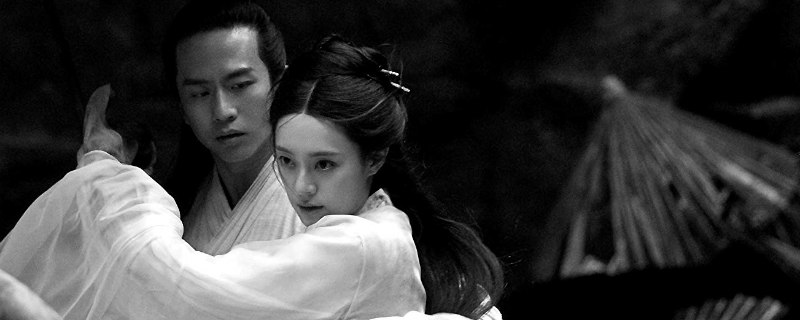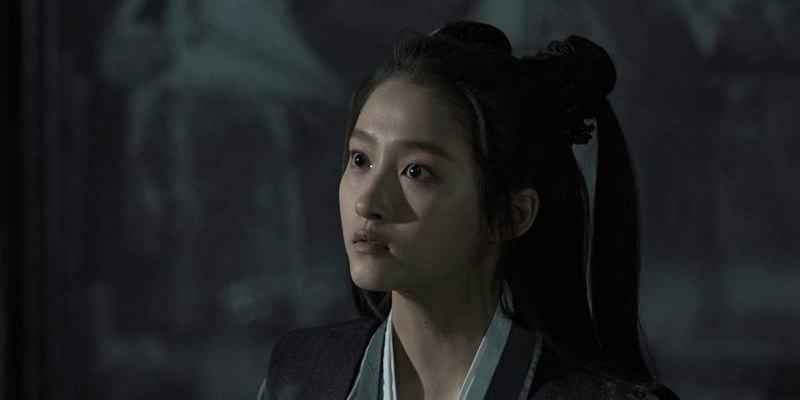Review by Ren Zelen
Directed by: Zhang Yimou
Starring: Deng Chao, Sun Li, Zheng Kai, Wang Qianyuan, Wang Jingchun, Hu Jun, Guan Xiaotong, Leo Wu

Zhang Yimou, director of visually spectacular films such as Hero, House of Flying Daggers, Raise the Red Lantern and Curse of the Golden Flower, was recently honoured at Venice with the Jaeger-LeCoultre Glory to the Filmmaker Award, which acknowledged his contribution in expanding the horizons of contemporary Chinese film.
As a director well known for his use of colour, Zhang’s latest film, Shadow, is rather a surprise, as he has chosen to set his story in an almost exclusively bi-chrome visual universe. He uses traditional Chinese ink-brush painting, with its mix of subdued whites, rich blacks and myriad shades of grey, as his inspiration.
Also significant in the film is the use of the tai chi diagram (known in the West as the Yin-and-Yang) which symbolises the interplay of masculine and feminine, as well as other opposing principals. Zhang recently stated that Shadow is a story of "struggle and survival" faced by women and common people in the face of the power exerted by rulers.
Set during the period of the Three Kingdoms (220-280 A.D.), Shadow reimagines a part of the Three Kingdoms epic - the story of the cunning and much-admired military commander Yu (Deng Chao) of the Pei Kingdom.


Having been seriously injured in battle and with failing health, Commander Yu retreats into hiding, but entrusts his position as much-esteemed Commander to the commoner Jing (also played by Chao). Jing is a lookalike who is indebted to Yu and has been named after a city the kingdom has lost.
Jing is the "Shadow" of the title - these were lookalikes adopted by powerful men in China to act as decoys when they were threatened by assassination or other dangers. The film is about the relationship between Commander Yu and his doppelgänger Jing, two men with an identical appearance but differing personalities. No-one, apart from Jing and Yu’s own wife, ‘Madam’ (Sun Li), knows about the real Commander’s failing health, or about the substitution, which is kept secret even from the young king of Pei (Zheng Kai).
The Pei Kingdom is in an unfortunate position. Rival forces have occupied the prime city of Jing and political relations with the haughty General Yang (Hu Jun) and his son Ping (Leo Wu), who control the city stronghold, are sensitive and precarious.
[ READ MORE: Now On Netflix - The Prodigy ]
[ READ MORE: Now On Netflix - The Prodigy ]
Hoping to establish a truce and regain some influence, the young king of Pei offers the hand of his beloved sister (Guan Xiaotong) to General Yang’s son Ping. Ping accepts the offer, but arrogantly declares that he will only take the Princess of Pei as a concubine, not a wife. This is a stinging insult to the Princess, the king and to his court.
The king had not consulted his sister before offering her in marriage and when she becomes aware of her brother’s actions and the affront of Ping’s response, she responds with her own reaction to the slight she has received from both of them. The women here have their own desires but have little control over their destinies - Yu’s wife, Madam, must resist her preference for the commoner Jing, and the Princess has to swallow her pride in the face of humiliation.
As the story unfolds, it becomes clear that Yu, concealed in his hiding place, is orchestrating a plan that involves Jing, his ‘shadow’, the young king and the mysterious Captain Tian (Wang Qianyuan), who comes to control an army of renegades and misfits.


His decoy Jing has instigated a duel with General Yang to fight for the taken city. Yu’s training sessions with Jing are held in Yu’s hiding place, only reachable through a secret passageway from the palace to a cave of black rock. The fights take place on a Yin and Yang diagram on the floor, created out of black and white stones.
When Jing’s fighting skills remains lacking, tellingly, it is here that Yu defers to his wife’s suggestion that, since it will be raining during the duel and because water is a "feminine" element, it may be auspicious for Jing to fight "with a feminine touch." She proceeds to demonstrate how this might be done. Not surprisingly most battles then occur around representations of Yin and Yang - the drop of (female) black in the (male) white part of the yin and yang symbol.
The weapon of choice is an imaginative and ingenious variation on the traditional oil-paper umbrella, which is usually merely decorative and associated with women. Here it is modified into a versatile weapon to be used by mostly male warriors.
[ READ MORE: Now On Netflix - Wonder Woman ]
[ READ MORE: Now On Netflix - Wonder Woman ]
Part of Yu’s plan involves the retaking of the city of Jing. This provides one of the most spectacular set pieces of the film. The clash unfolds with the agility, grace and visual beauty familiar from Zhang’s previous wuxia conflicts. In a one-on-one fight, Yu’s decoy Jing faces General Yang on a bamboo platform in a river gorge straight out of a traditional Chinese ink painting.
Meanwhile, Captain Tian’s force invade the city and deploy umbrellas (a feminine symbol) made out of blades of iron (an element associated with the male), not only as weapons but also, in some of the most stunning images of the film, for other more unusual and unexpected purposes.


The film takes place throughout several days of driving rain - this makes the choreography (by Dee Dee, who choreographed Tarantino’s Kill Bill) look even more dramatic, as hair, armaments and flowing garments glitter and shine with a film of water, which also emphasises the weightiness of their momentum.
Shadow is visually ravishing in its ethereal and painterly look. Occasional flashes of colour - the golden light of a candle, a splash of blood - become all the more striking. Praise must go to costume designer Chen Minzheng, who makes the ubiquitous black, white and grey robes look like hand-painted Chinese ink drawings, which contrast with the texture of other materials such as black lacquer, stone and shimmering mother-of-pearl.
Production designer Ma Kwong Wing (aka Horace Ma) excels in continuing the look in the Court interiors and the misty, rain-soaked exterior scenes. In the musical sequences Lao Zai, (aka Loudboy) underlines the theme of Yin and Yang by featuring male and female duets and weaving together the zither and flute in the score.
In Shadow, the acclaimed Chinese director creates another visually stunning cinematic experience which examines the theme of ambition versus honour and personal happiness. To conclude with Zhang’s own explanation, "This film is about struggle, survival…how a common man can manage not only to survive amidst the power games of kings and the aristocracy, but even to turn defeat into victory."

Shadow is on Netflix UK now.
"We're seeing the formation of a new wave of women director shock merchants, and Lullaby is a welcome addition to their growing canon."— 𝕋𝕙𝕖𝕄𝕠𝕧𝕚𝕖𝕎𝕒𝕗𝕗𝕝𝕖𝕣.𝕔𝕠𝕞 🎬 (@themoviewaffler) January 16, 2020
LULLABY is in UK/ROI cinemas now.
Read @hilliseric's reviewhttps://t.co/7ziHJXXW1e pic.twitter.com/8EATRYVtHK


